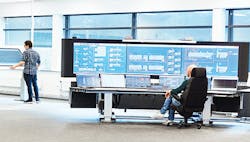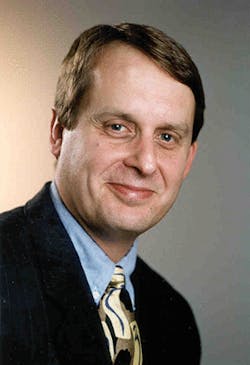The forces reshaping tomorrow's DCS
Since its introduction more than four decades ago, the distributed control system (DCS) has made enormous contributions to the safe, efficient and reliable operation of innumerable industrial processes around the world. And when it comes to global footprint, one supplier, ABB, has had market-share bragging rights for at least half that time, according to ARC Advisory Group's annual reports.
It should come as no surprise then that ABB is paying very close attention to the technological and demographic winds of change that are reshaping how automation gets done in the 2020s and beyond. To learn more about these forces—and how ABB is responding to them—Control caught up with Mark Taft, group vice president responsible for ABB's process control systems offerings worldwide.
Q: At this moment in time, there seems to be a confluence of user-driven initiatives toward control system openness that show real promise. What do you see as the motivating force for these movements, and how do you expect they’ll affect ABB’s DCS offering in the months and years to come?
Group vice president, ABB
A: One key difference with initiatives like OPAF, NOA and Modular Automation is that customers have taken a much more active role in driving them forward. Because of that, I believe there will be much broader adoption and engagement, and ultimately, they'll achieve their objectives.
One of the major drivers for DCS owners is a frustration that lifecycle costs for supporting their automation assets are higher than they'd like them to be. Further, they feel locked in by suppliers and control architectures that make it hard to innovate or add new functionality. Our customers’ businesses have changed, too. They've overhauled the portfolio of products they take to market through divestitures and acquisitions. So, we now have companies that once relied on one or two suppliers for their automation needs facing a portfolio of very diverse automation technologies. This is especially stressful for central support organizations.
DCS owners are looking for a more simplified engineering and commissioning paradigm than what they've faced in the past. They need to be more agile, able to reconfigure their manufacturing processes to deploy new product variants. And, they're building plants in parts of the world that just don't have automation expertise available. So, they need a system that can be automatically commissioned and isn't so reliant on having expertise on the ground.
Q: “The Power of Integration” has long been a rallying cry for ABB. But in earlier days we were more concerned with the integration of control platforms with other plant systems to deliver synergistic value. What does the Power of Integration mean today in the context of these new dynamics?
A: I still think integration is going to be desirable and it's something that our customers are still going to be very interested in. But I think the role of the control system in providing that integration is going to change. Until now, the DCS was the glue that provided that integration, and as such we were focused on integrating other systems with the control system itself, and then exposing that information in a way that was easy to use for our customers. Looking forward, the control system will still be key in providing information from the plant floor. But with evolving, standardized models such as OPC UA, the ability to exchange information between applications from different suppliers will be easier.
I also think that how that integration is supported will remain a key area of potential differentiation in this new standards-driven market. In this brave new world, it’s up to us, as suppliers, to anticipate and fill those gaps. We need to ensure that customers meet their objectives, and don’t have to compromise.
Q: Another undeniable trend affecting the process industries is a demographic shift from the generations that created and optimized the original DCS to digital natives unfamiliar with the “old” technology that we sometimes find so comforting. Will this shift accelerate the uptake of new automation paradigms?
A: Frankly, my generation has started to retire, and that transformation has begun. This new generation of management, engineers and operators want to see something more modern, more like the technology that they've grown up with. They're much more willing to tackle their automation and optimization challenges in new ways.
Another result of this shift is an exodus of the most experienced personnel. We have to provide an automation platform that incorporates innovative new technologies providing intelligent, guided assistance to the people using these systems.
Q: While we strive to recover from the COVID-19 pandemic, waiting in the wings is the even more urgent issue of climate change and industrial sustainability. What role can automation platforms play in helping society make strides toward a decarbonized industry?
A: First, as a product supplier, ABB has a keen focus on supporting a low carbon society. We’ve set a target to be completely carbon neutral in our own operations by 2030. And that means we need to deliver products that are more energy efficient in their designs, and incorporate sustainable materials to help meet that objective. And, of course, we'll focus on providing products that have lower cooling requirements, lower power consumption and use recyclable materials, not only in our products, but in the packaging that we used to ship them around the world.
Another aspect of sustainability is reducing the amount of hardware required to run a system by taking advantage of virtualization and other technology advances in that area. So, as a product supplier, that's where we play. But probably the bigger impact is that ABB has also set a target to support our customers to reduce their carbon emissions by at least 100 megatonnes by 2030. That's about 100 billion kilograms, equivalent to taking 30 million combustion vehicles off the road.
Q: From a higher view, what will the DCS of the future look like compared to the traditional DCS we used for the past 30 years?
A: From an engineering standpoint, there's a real push from our customers now to raise the level of engineering above the coding of control logic for every automation project.
Rather, I see us raising project engineering to a more modular level from both software and hardware perspectives. That will help with agile innovation, making it easier to add new functions and technologies and deploy what we call extended automation components in a way that doesn't affect the entire system. We need to have modular components that can be upgraded separately and still play together. This desire to develop applications in a way that's completely divorced from how they'll be deployed will be fulfilled.
Cybersecurity will be out of the box, built into the components rather than layered on top. I also see us working to automate engineering and commissioning activities. And you won't need to have the same innate, deep knowledge that you do today about how the system works to deploy it and support it in the field.
It's also very important to ABB to think of new technologies in the context of the thousands of automation systems already in use out there. From our perspective, that's going to be critical: helping our customers make that jump forward to the new technologies, but retain the intellectual investments they've made to get them to where they are today.
To hear more of Mark Taft's insights into the future of the DCS, listen to the companion Control Amplified podcast episode on ControlGlobal.com or subscribe at the iTunes store or Google Play podcasts.


